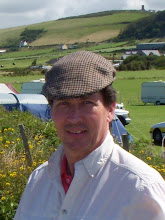I arrive at Cilwinllan, the home of an aunt and uncle of mine – and what a charming home it is indeed. It feels like I’m sailing on a sea of kindness. This is a perfectly peaceful place, awash with the burble and chatter of flowing streams. I walk through cloudbursts; I ramble; I run. I soak up the sounds of the rushing waters and the bleating sheep; I’m almost completely at one with the peacefulness that sighs inaudibly beneath, through, within the clamor of the landscape.
All about me are verdant seas of fern, wooded glens, small random hamlets, shepherds climbing and farm girls calling after their dogs and sheep. Just as it has always been! O, how agreeable it all is! Everything is charming – a district of sheer delight. I rise in the morning and laze about as luxuriantly as I please. I watch idly as my uncle shears some wandering lambs. Rays of sunlight descend through the treetops into the stillness of the farmyard.
I go to Chapel on Sunday morning and savor the sounds of the sheep bleating in faint counterpoint to our lofty devotions to the saints. Monday morning: I strike out for Cae-tu-cefn-i’r- Beudy [“Field-behind-the-Cowshed”], where I sit on the seat of a hay-mowing machine. I look out, amazed, over the small, sloping fields all bright and green. I see groves of trees in a narrow valley. On the summit of one of the farthest ridges, I can make out the tiny village of Darowen smiling down at me affectionately amidst a raiment of white and green. The soft shapeliness of the mountain known as Aran Fawddwy muses in silence beneath a billowing shroud of mist.
Off to my side, the man from Rhiwgoch farm and his son are mowing hay upon a narrow strip of steep, craggy land. There’s less and less and less…until the last thin swathe disappears entirely. The son takes the tractor to another field, while the father stays behind to tidy up with his scythe. It’s a gentle, quiet morning. As the scent of new-mown hay diffuses, the voice of a three-year-old child chimes in from nearby. She approaches her dad with some difficulty through the felled swathes. He lays his scythe down and bends to his knee, then draws the little girl to him. He strokes her; pecks her with kisses. I see her pretty green frock merging into his cotton waistcoat, and her yellow-blond hair spreads out over his tan-dark arms.
It’s such a charming scene! Here, my fellow countrymen, is your genuine birthright in all its glory. Here is your throne and your consolation with which to endure the interminable perfidy arrayed against you. My Wales, my own people…I love you beyond the power of words to say. During every dark hour, still you bend to your daily toil, sustained by oceans of virtue and seas of compassion. Hail to thee, dearest Wales.
Tomorrow, I must turn back unwillingly and leave behind the people, the experiences and the vistas that have served as balm for my heart. I’ll be back to see you again before the end of the holidays. Once more, you have restored in me a lost vitality.


No comments:
Post a Comment